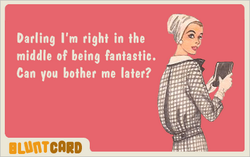How time at the desk can wreck your writing.
A common 'difficulty' my clients report is too little time at the desk. The assumption here of course, is that more desk time equals more words on the page.
How is it then, that for writers who do have time to write a common experience is guilt at not using the time? Sitting there doggedly, hour after hour, day after day miserably fostering and maintaining low productivity.
In my experience it is more mind than time that determines creative productivity. I have clients with very full, non-writing full-time jobs plus kids, who write every day, no matter what. Not that this was always the case. Once we addressed the all-or-nothing thinking (I can't write unless I have regular long blocks of time uninterrupted) and worked out new attitudes and approaches it was incredible to observe the shift.
Yes the blocks of time are necessary - but they are not the only way to write.
Another killer for writing flow is the expectation that the work must be good. First time. And a sense that writing is serious business. One must have a certain posture, a certain seriousness and an air of reverence for this serious business. Because of its importance to the writer, the writing itself must be taken very seriously.
So, while writers strive to find more time in solitude, creating the time and space to write, it may well be that, in reality, more writing may come from less time at the desk. It may be that time spent on incorporating fun and/or play into your day and your writing ritual will yield more creative output than twice that amount of allocated time sitting miserably at your desk criticising yourself for not coming up with the goods.
Brain researcher and author, Dan Siegel has identified that creativity and emotional well being are served best by habits that integrate the various parts of the brain. He also says, surprise surprise, that creativity can't be forced. Instead, the writer can create the physical, mental and emotional states that facilitate well-being. These also facilitate creativity.
Siegel's healthy mind platter comprises refreshingly achievable elements. On this daily platter for brain health and emotional well-being are the following:
Simple, manageable daily practices demonstrated to foster and maintain well-being.
If you'd like to hear more about the energising effects of play and its role in fostering creativity, there was a great discussion on Radio National's Life Matters program this morning. I challenge you to listen to it and not feel like changing your own practices !!
Here's the link:
http://www.abc.net.au/radionational/programs/lifematters/all-work-and-no-play-makes-jack-a-dull-boy/5733240
All the best,
Alison
www.amindofonesown.com
.
How is it then, that for writers who do have time to write a common experience is guilt at not using the time? Sitting there doggedly, hour after hour, day after day miserably fostering and maintaining low productivity.
In my experience it is more mind than time that determines creative productivity. I have clients with very full, non-writing full-time jobs plus kids, who write every day, no matter what. Not that this was always the case. Once we addressed the all-or-nothing thinking (I can't write unless I have regular long blocks of time uninterrupted) and worked out new attitudes and approaches it was incredible to observe the shift.
Yes the blocks of time are necessary - but they are not the only way to write.
Another killer for writing flow is the expectation that the work must be good. First time. And a sense that writing is serious business. One must have a certain posture, a certain seriousness and an air of reverence for this serious business. Because of its importance to the writer, the writing itself must be taken very seriously.
So, while writers strive to find more time in solitude, creating the time and space to write, it may well be that, in reality, more writing may come from less time at the desk. It may be that time spent on incorporating fun and/or play into your day and your writing ritual will yield more creative output than twice that amount of allocated time sitting miserably at your desk criticising yourself for not coming up with the goods.
Brain researcher and author, Dan Siegel has identified that creativity and emotional well being are served best by habits that integrate the various parts of the brain. He also says, surprise surprise, that creativity can't be forced. Instead, the writer can create the physical, mental and emotional states that facilitate well-being. These also facilitate creativity.
Siegel's healthy mind platter comprises refreshingly achievable elements. On this daily platter for brain health and emotional well-being are the following:
- Sleep time - decent sleep of at least 8 hours when possible.
- Physical time - exercise.
- Focus time - your writing !
- Time in - a mindfulness/mediation practice. This can be as simple as 12 minutes of quite, focused breath- awareness. Longer practices can be more beneficial than short, but short are better than none. Some have suggested that as little as one minute a day of some sort of focused practice can bring about helpful brain integration changes.
- Down time - just whatever you actually feel like doing.
- Play/fun time - transformational for creativity (and can be incorporated into your focus time/exercise/down-time/connecting time).
- Connecting/social time
Simple, manageable daily practices demonstrated to foster and maintain well-being.
If you'd like to hear more about the energising effects of play and its role in fostering creativity, there was a great discussion on Radio National's Life Matters program this morning. I challenge you to listen to it and not feel like changing your own practices !!
Here's the link:
http://www.abc.net.au/radionational/programs/lifematters/all-work-and-no-play-makes-jack-a-dull-boy/5733240
All the best,
Alison
www.amindofonesown.com
.


 RSS Feed
RSS Feed